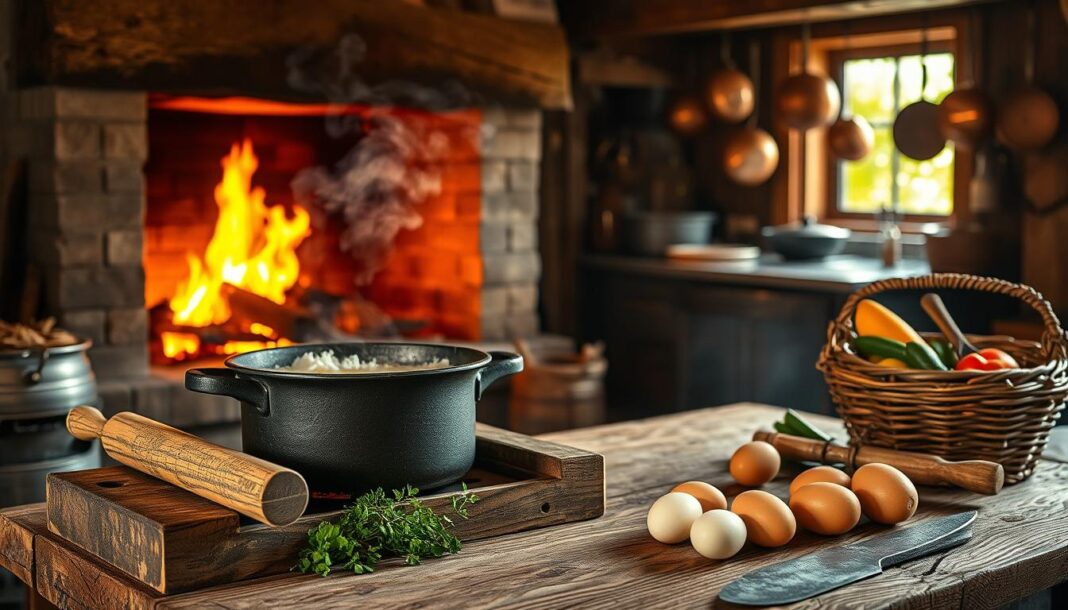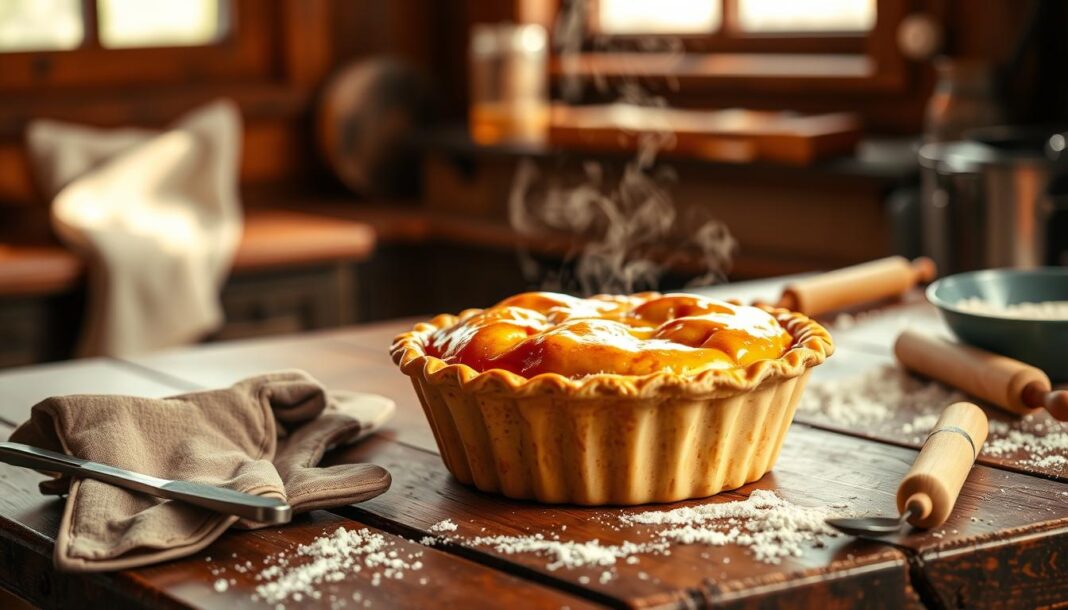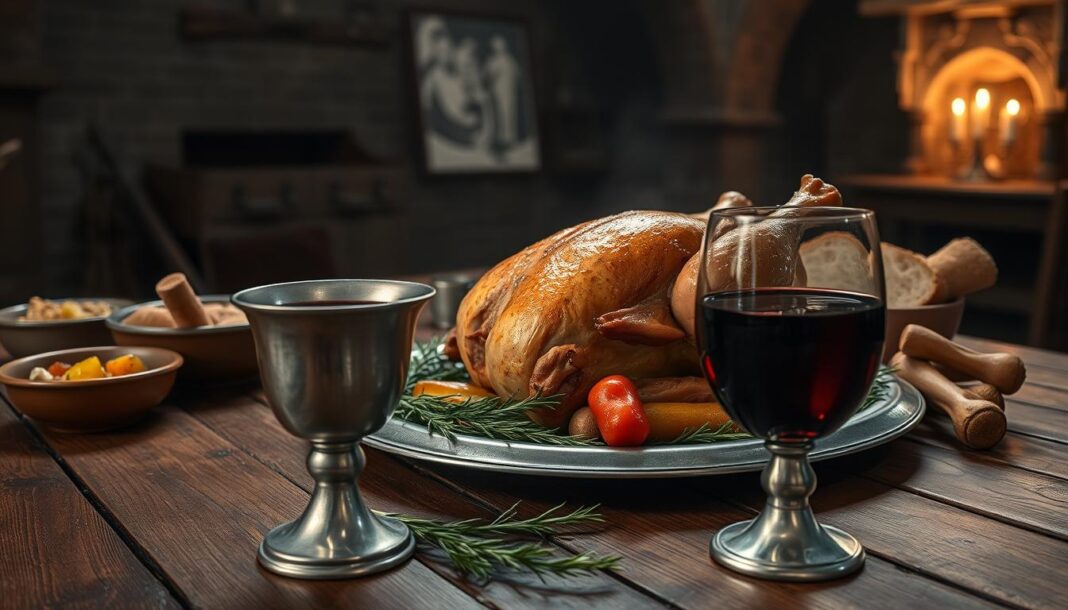At Historical Foods, we cherish the treasured recipes passed down through generations. These traditional cooking methods and recipes not only bring flavor to our tables but also connect us to our culinary heritage.
We’ve curated 15 exceptional recipes from vintage cookbooks, including church and junior league cookbooks, and classics found on grandma’s bookshelf. These time-honored recipes reveal the rich heritage of American culinary traditions.
By exploring these traditional cooking techniques, we uncover the resourcefulness and community spirit of our ancestors. Their methods, from slow cooking to preservation, allowed families to enjoy seasonal produce year-round.
Key Takeaways
- Discover the rich heritage behind traditional American cooking.
- Learn about time-honored cooking techniques that defined our ancestors’ kitchens.
- Understand why these recipes continue to resonate with modern cooks.
- Explore how traditional cooking methods preserve family stories and cultural history.
- Find practical guidance for incorporating these recipes into contemporary kitchens.
The Revival of Old Time Foods
There’s a growing interest in old-fashioned recipes, driven by a desire for authenticity and connection to our culinary heritage. We’re seeing a significant shift towards traditional cooking methods and vintage recipes, as people seek to recreate the comfort and nostalgia of grandma’s home cooking.
This revival is not just about nostalgia; it’s also driven by a desire for sustainable food practices and a reconnection with cultural heritage. The digital age has played a surprising role in this revival, with social media platforms showcasing vintage recipes and techniques, and making it easier for people to share and discover traditional cooking methods.
Why Traditional Recipes Are Making a Comeback
Traditional recipes are making a comeback due to the growing interest in sustainable food practices and the desire to reconnect with cultural heritage through cooking. These recipes often involve techniques that require time and patience, such as slow simmering, fermentation, and careful preservation methods, which result in distinctive flavors.
The Comfort and Nostalgia of Grandma’s Cooking
Grandma’s cooking represents more than just food; it embodies comfort, care, and the transmission of family values through shared meals and cooking knowledge. The old-fashioned recipes in our collection capture this cozy, nostalgic feeling, with comfort food classics like casseroles, soups, and sweet treats that feel like a warm hug.
| Traditional Cooking Methods | Characteristics | Examples |
|---|---|---|
| Slow Cooking | Requires patience, rich flavors | Stews, Braises |
| Preservation Methods | Extends shelf life, unique flavors | Pickling, Canning, Drying |
| One-Pot Meals | Convenient, hearty | Casseroles, Skillet Meals |
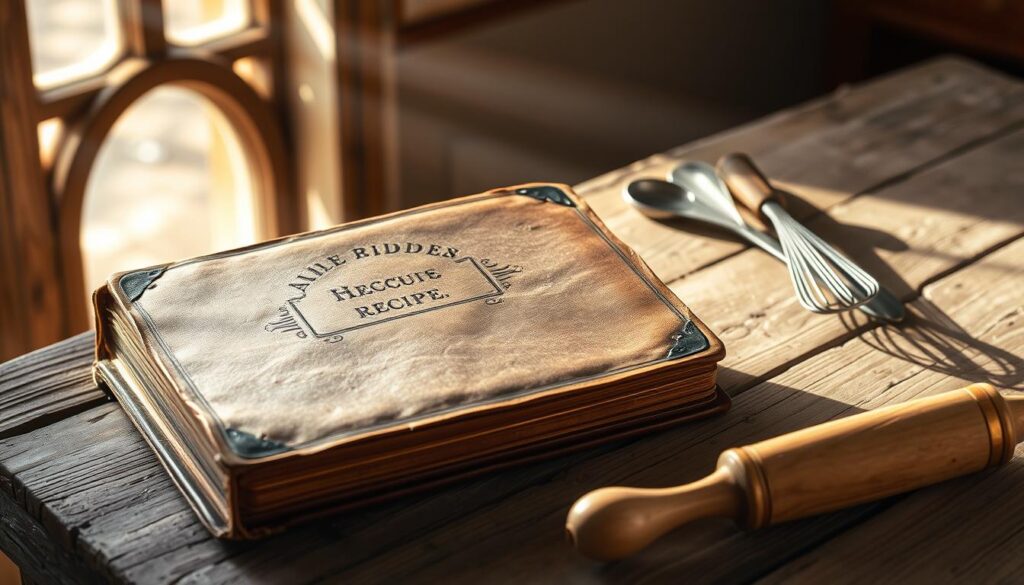
Traditional Cooking Methods That Defined Old Time Foods
Time-honored cooking techniques were essential in crafting the authentic flavors of old time foods. These traditional methods not only shaped the character of various dishes but also influenced the way people cooked and interacted with food.
Slow Cooking and One-Pot Meals
Slow cooking and one-pot meals were staples in many households, allowing for the preparation of hearty, flavorful meals while managing other household duties. This method ensured that food was tender and rich in flavor.
Cast Iron Cooking Techniques
Cooking with cast iron imparted unique flavors to food, a quality that modern cookware often fails to replicate. The chemistry behind cast iron cooking makes it an essential tool for authentic traditional recipes.
Preservation Methods: Pickling, Canning, and Drying
Preservation techniques like pickling, canning, and drying were crucial for food security during winter months. These methods created new flavor profiles, such as pickled vegetables, that became staples in their own right. A traditional recipe like pickled green beans, passed down through generations, exemplifies the effectiveness of these preservation methods.
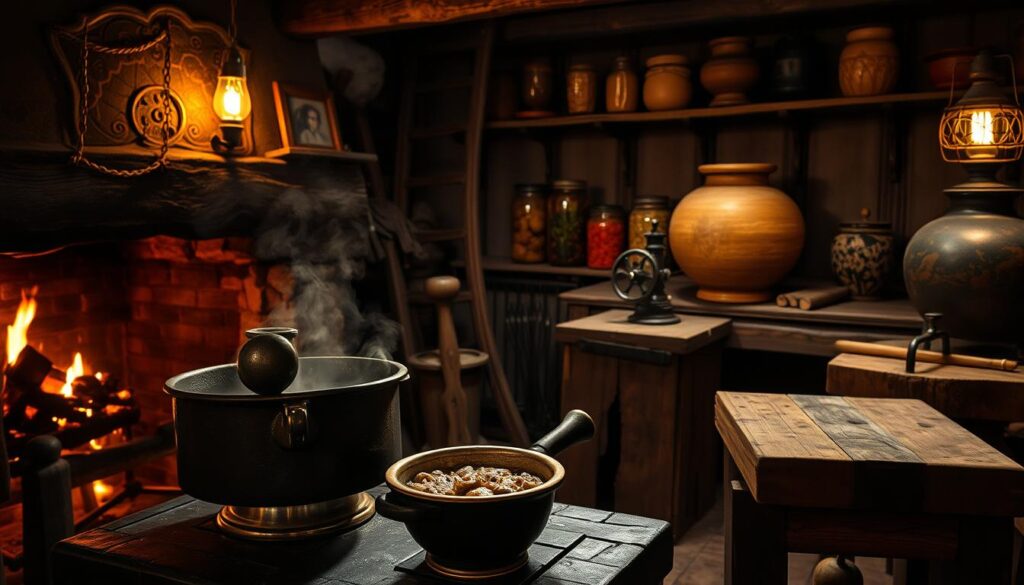
| Cooking Method | Description | Example Dish |
|---|---|---|
| Slow Cooking | Cooking food over low heat for an extended period | Pot Roast |
| Cast Iron Cooking | Cooking with cast iron cookware to impart unique flavors | Cast Iron Skillet Cornbread |
| Preservation | Methods like pickling, canning, and drying to preserve food | Pickled Green Beans |
Understanding these traditional cooking methods provides valuable insight for modern cooks looking to recreate authentic versions of heritage recipes over time.
The Art of Making Homemade Bread
The art of bread-making has been a cornerstone of home cooking for generations, with homemade bread being a staple in many cultures. We explore how this tradition has been passed down through the years, with daily or weekly baking rituals that structured household routines.
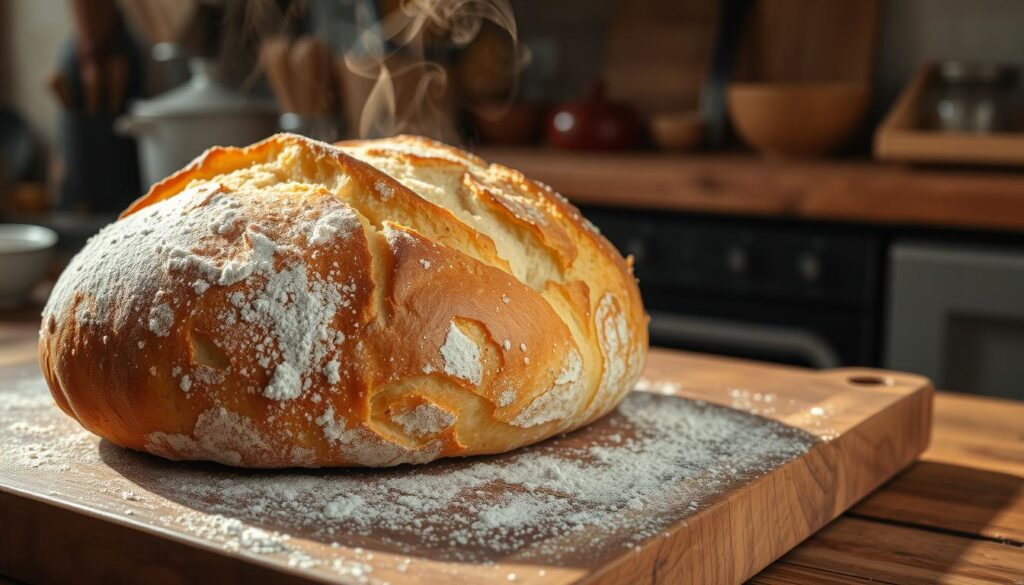
Classic Cornbread Recipes
Classic cornbread recipes varied significantly by region, with Southern versions typically unsweetened and Northern versions incorporating sugar. Combining cornmeal and frozen corn kernels makes this cornbread extra homey, as seen in modified recipes from old cookbooks dated back to 1890.
Vanilla Wafers and Other Forgotten Treats
Vanilla wafers and other simple cookies were staples in home bakers’ repertoires, serving both as everyday treats and as ingredients in more elaborate desserts like banana pudding. These forgotten treats often featured simple, pantry-friendly ingredients, making them accessible even during times of scarcity.
Hearty Old-Fashioned Soups and Stews
The art of crafting a delicious, satisfying soup or stew is a timeless tradition that continues to bring people together. These comforting meals have been a staple in American cuisine for generations, providing warmth and nourishment to families.
Hearty soups and stews formed the backbone of economical family cooking, transforming humble ingredients into satisfying meals through slow simmering and careful seasoning. Two classic examples of this are Chicken and Dumplings and Split Pea Soup with Ham Hocks.
Chicken and Dumplings: A Timeless Comfort Food
Chicken and Dumplings represents the pinnacle of American comfort food, with regional variations reflecting local ingredients and cultural influences. Our recipe for Chicken and Dumplings uses a whole chicken, providing a mix of light and dark meat, and is a traditional take on a beloved dish.
Split Pea Soup with Ham Hocks
Split Pea Soup with Ham Hocks is another classic, exemplifying the waste-not philosophy of traditional cooking. This soup uses every part of the animal, creating extraordinary flavor from what might otherwise be discarded. A simple addition like a tablespoon of lemon can give this deeply savory soup a hint of sunshine.
- The science behind perfect dumplings involves understanding the balance of ingredients and cooking techniques.
- These one-pot meals were practical solutions for busy households, allowing cooks to prepare nutritious, filling food while attending to other responsibilities.
Classic Casseroles That Stand the Test of Time
From holiday gatherings to weeknight dinners, casseroles have become an integral part of American cooking. These dishes embody the perfect blend of convenience, comfort, and flavor, making them a staple in many households.
Casseroles have a rich history in American cuisine, often symbolizing mid-century cooking that combined ease with hearty, satisfying meals. We explore how these classic dishes have evolved over time, incorporating new ingredients while retaining their comforting essence.
Green Bean Casserole: A Holiday Staple
Green bean casserole is a quintessential holiday dish that originated in the Campbell’s test kitchen in 1955. Our upgraded version of this classic casserole recipe skips the canned soup mix for a creamy mushroom sauce made with fresh button mushrooms, chicken broth, and whole milk. Topped with crispy fried shallots, this dish is sure to become a new family favorite.
Tuna Noodle Casserole: Budget-Friendly Comfort
Tuna noodle casserole is another beloved classic that has been a go-to for busy cooks, especially in the South. This comforting dish is not only budget-friendly but also incredibly easy to prepare. By using fresh ingredients and updating traditional recipes, we can make this classic casserole even more delicious and satisfying.
These classic casseroles have stood the test of time due to their practical advantages, including make-ahead preparation and efficient use of leftovers. Whether you’re cooking for a crowd or a family dinner, casseroles remain a relevant and comforting choice.
Meat Dishes From Yesteryear
Classic meat recipes, such as pot roast and chicken-fried steak, remain staples in many households, evoking a sense of nostalgia and comfort. These traditional dishes not only satisfied hunger but also played a significant role in shaping family traditions and cultural identity.
We examine how these meat dishes reflected both celebration and everyday sustenance, with specific cuts and preparations marking weekly rhythms and special occasions. The science behind traditional cooking methods, such as braising tough cuts, demonstrates the culinary wisdom embedded in these practices.
The Sunday Dinner Tradition
Pot roast exemplifies the Sunday dinner tradition that structured family life for generations. The long, slow cooking process accommodated church attendance while creating a meal worthy of the day’s significance. A classic pot roast recipe involves braising chuck roast with turnips, new potatoes, and carrots until it’s rich, tender, and succulent.
| Ingredient | Quantity | Preparation |
|---|---|---|
| Chuck Roast | 3 lbs | Browned on all sides |
| Turnips | 2 medium | Peel and chop |
| New Potatoes | 4-5 | Halve or quarter |
| Carrots | 4 | Peel and slice |
Chicken-Fried Steak with Creamy Gravy
Chicken-fried steak represents the ingenuity of frontier cooking, where tenderizing techniques transformed affordable cuts into satisfying meals. Served with peppery, creamy gravy, this old-school Southern dish is a testament to the resourcefulness of traditional cooks.
The accompanying creamy gravy showcases how traditional cooks created rich, flavorful sauces from simple pan drippings, flour, and milk—techniques that modern cooks often overlook. These hearty meat dishes tell stories of regional identity, economic circumstances, and cultural values that continue to resonate in American foodways.
Side Dishes That Defined Old Time Foods
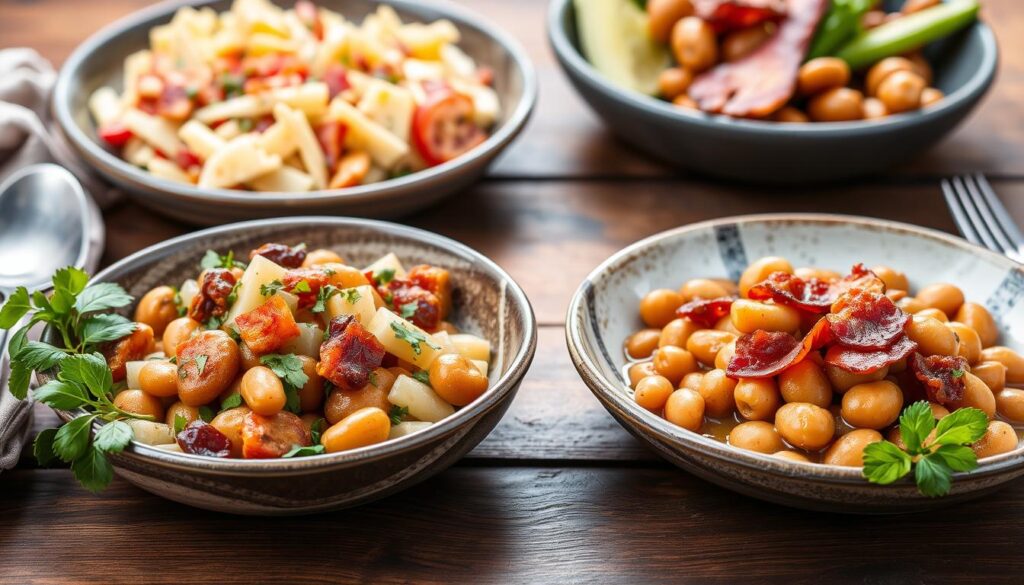
In the realm of old-time foods, traditional Southern side dishes stand out for their simplicity, flavor, and historical significance. These dishes not only complemented main courses but also showcased seasonal produce and preserved foods, reflecting regional agriculture and preservation practices.
Copper Pennies: Sweet and Tangy Carrots
Copper pennies—a vintage carrot dish featuring a sweet-tangy marinade—demonstrate how humble vegetables were transformed through distinctive preparation methods that created memorable flavor profiles. This retro dish is made for being sopped up with cornbread, as noted by our Southern Living Test Kitchen.
Butterbeans with Bacon
Southern-style butterbeans are a budget-friendly, easy side dish that’s most delicious when cooked with bacon, of course. This traditional recipe exemplifies how small amounts of pork were used to flavor vegetable dishes, creating satisfying sides that stretched limited resources.
Church Cookbook Classics
Church cookbooks have long been treasured repositories of family recipes and community traditions. These cookbooks, often compiled by church groups, preserve regional cooking traditions and serve as important historical documents of American foodways.
The recipes within these cookbooks, such as pimiento cheese and cheese wafers, represent quintessential home cooking. Pimiento cheese, in particular, is a Southern staple that has evolved from a commercial product to a homemade specialty with countless family variations.
Pimiento Cheese: The Southern Staple
Pimiento cheese is a classic recipe that involves a delicate balance of cheese varieties, proper grating techniques, and allowing flavors to meld. This beloved spread is a testament to the power of vintage recipes in modern kitchens.
Cheese Wafers and Other Appetizers
Cheese wafers are another timeless favorite, reflecting the importance of hospitality in Southern culture. These simple yet elegant appetizers are a staple at gatherings, showcasing the art of transforming basic ingredients into something special.
Vintage Pies That Deserve a Revival
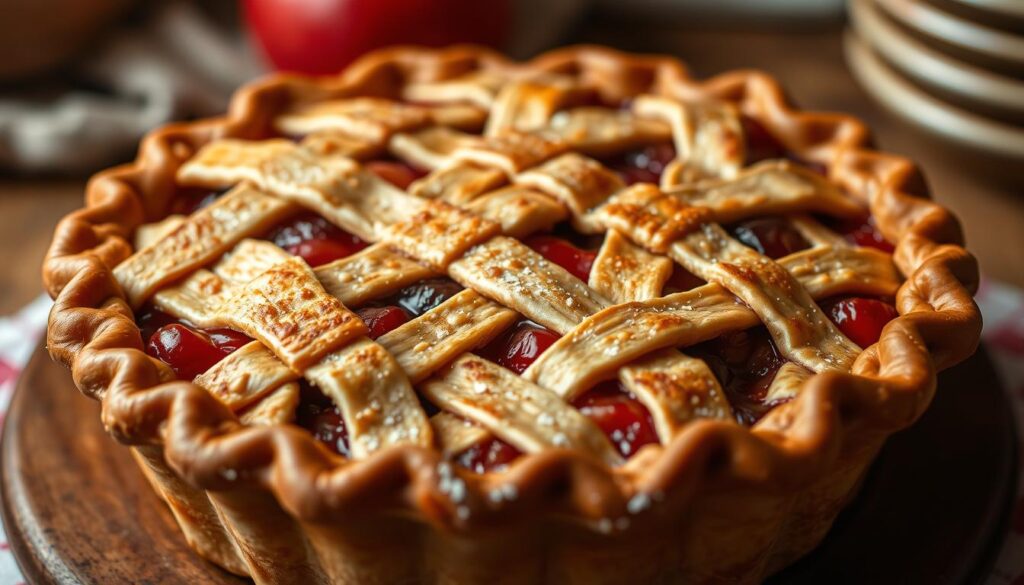
As we explore the world of vintage pies, we uncover the rich history and tradition behind these beloved desserts. Vintage pies have been a cornerstone of American cuisine, representing both everyday sustenance and celebratory traditions.
Apple Pie: The All-American Classic
Apple pie is a timeless favorite, with its buttery crust perfectly complementing the soft apple filling. This classic dessert has European roots but has become an American staple, symbolizing warmth and comfort.
Desperation Pies: Making Do with What You Have
Desperation pies, born out of necessity during economic hardships, showcase the ingenuity of home cooks. Using pantry staples like molasses and dried fruits, these pies demonstrate culinary innovation at its finest.
The revival of vintage pie recipes not only connects us to our culinary heritage but also inspires modern bakers to experiment with traditional techniques and ingredients, creating a bridge between past and present.
Traditional Cakes From Grandma’s Kitchen

The art of baking traditional cakes is a cherished family tradition that evokes memories of grandma’s kitchen. These cakes were often the centerpiece of family gatherings and celebrations, with recipes passed down through generations. We explore two such classic cakes: Coca-Cola Cake and Prune Cake.
Coca-Cola Cake: A Southern Classic
Coca-Cola cake is a moist and chocolaty dessert that incorporates Coca-Cola into both the cake and the cream cheese frosting. This unique recipe showcases how commercial ingredients became integral to traditional baking. The carbonation in Coca-Cola affects the leavening, creating a tender crumb.
Prune Cake: The Forgotten Favorite
Prune cake, once a prized dessert, has fallen out of favor, but its natural sweetness and moisture make it a delightful treat. This cake represents how ingredients once valued for their properties can become forgotten over time.
These traditional cakes not only bring back memories but also teach us about the science and techniques behind their creation. Understanding the role of ingredients like buttermilk and sour cream helps modern bakers recreate these classic desserts.
Old-Fashioned Puddings and Custards
The world of old-fashioned puddings and custards is rich with history and flavor, representing a culinary heritage worth exploring. These traditional desserts have been a staple in American kitchens for generations, providing comfort and satisfaction through their creamy textures and rich flavors.
Rice Pudding: Comfort in a Bowl
Rice pudding is a classic example of how simple ingredients can be transformed into a comforting dessert. By using arborio rice, which releases its starches when cooked low and slow with milk, vanilla extract, and sugar, we create a creamy and satisfying recipe. Folding in whipped cream adds a lovely lightness to this traditional dessert.
Banana Pudding with Vanilla Wafers
Banana pudding with vanilla wafers is another beloved dessert that showcases the evolution of traditional recipes. This classic dessert combines a graham cracker crust with a sweet custard and homemade whipped cream, making it a timeless treat. Our recipe stays true to its roots while offering a deliciously creamy experience.
Forgotten Salads of the Past
American culinary history is replete with forgotten salads that not only reflect the cultural and social nuances of their time but also showcase the evolution of the term ‘salad’. These vintage recipes were staples at family gatherings and church potlucks, offering a glimpse into the past.
The mid-century America saw the rise of congealed and molded salads, which were considered sophisticated and modern. We will explore how these traditional dishes were prepared and their significance in American culinary history.
Congealed Salads and Gelatin Molds
Congealed salads, often made with fruit and cream, were a favorite at social gatherings. These vintage gelatin recipes were a testament to the creativity of home cooks who utilized the newly accessible powdered gelatin.
Layered Salads for Church Potlucks
Layered salads, another classic, were visually appealing and easy to assemble. These salads were a staple at church potlucks, where they were chilled until serving time, making them a convenient and crowd-pleasing dish.
Preserving Family Recipes for Future Generations
Family recipes are a treasure trove of stories, flavors, and memories that deserve to be preserved for generations to come. These cherished family recipes not only provide culinary instructions but also serve as cultural artifacts that preserve family stories, values, and traditions.
Documenting Handwritten Recipe Cards
Handwritten recipe cards are more than just cooking instructions; they capture personal notations, adaptations, and memories that contextualize dishes within family history. The physical characteristics of these documents, from handwriting styles to food stains and margin notes, provide valuable historical information.
Creating Modern Family Cookbooks
Creating modern family cookbooks allows for combining traditional recipes with contemporary documentation methods, ensuring these culinary traditions remain accessible to younger generations at home. This process often reveals forgotten dishes, techniques, and ingredients that might otherwise be lost to time.
Adapting Old Time Recipes for Modern Kitchens
The art of adapting vintage recipes lies in balancing tradition with modern convenience. As we explore how to make old time recipes suitable for modern kitchens, we’ll examine the key considerations for maintaining their traditional flavor profiles while incorporating contemporary cooking techniques.
Substituting Ingredients While Maintaining Flavor
Substituting ingredients in old time recipes requires a deep understanding of the functional and flavor roles of the original components. For instance, replacing lard with other fats in pastry or using buttermilk in baking demands careful consideration to maintain the desired texture and taste.
Time-Saving Tips for Traditional Recipes
Modern kitchen equipment such as pressure cookers, stand mixers, and food processors can significantly reduce the labor involved in traditional recipes. Understanding which steps are essential to authenticity and which can be streamlined is crucial for adapting vintage recipes.
| Recipe Component | Traditional Method | Modern Adaptation |
|---|---|---|
| Cooking Method | Slow cooking on the stovetop | Using a pressure cooker to reduce time |
| Ingredients | Lard for pastry | Vegetable shortening or modern fat substitutes for a creamier texture |
| Preparation | Manual mixing and kneading for a hearty chicken dinner | Using a stand mixer for efficiency in preparing vintage recipes |
By applying these adaptations, we can enjoy traditional recipe flavors in a modern context, making old time cooking accessible to a new generation.
The Timeless Appeal of Old Time Foods
There’s something undeniably special about old time foods that continues to resonate with people today. The allure of traditional recipes lies in their tested reliability and the nostalgia they evoke. These dishes have been refined over generations to achieve consistent, satisfying results, making them a staple in many households.
Old time foods connect us to our cultural heritage and family history, transcending their culinary properties to become vehicles for memory and identity. The cyclical nature of food trends has led to a rediscovery of traditional techniques such as fermentation and whole animal cooking, which are now considered cutting-edge.
By embracing old time foods, we not only preserve traditional cooking knowledge but also promote sustainable practices that minimize waste and emphasize seasonal cooking. As we continue to explore and adapt these recipes, we honor the culinary wisdom developed over centuries in home kitchens.
